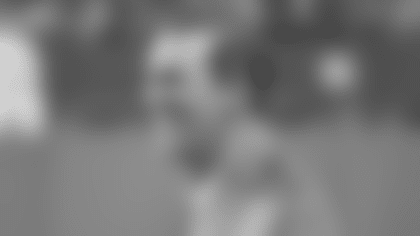Before head referee Gene Steratore did the coin toss, he turned on his microphone and belted out sweet words that will ring around the NFL.
"Men, it's good to be back," he said.
The feeling was mutual.
When Steratore and his crew walked into M&T Bank Stadium for the first time Thursday night, Baltimore's crowd stood and gave them an ovation. Steratore admitted he got a bit choked up.
When the players came onto the field, a number shook hands, hugged and joked with the officials. They picked up their usual dialogue throughout the game, as if old friends were meeting again.
Usually the refs aren't supposed to be the center of attention. In fact, their goal is to go unnoticed, Steratore said.
But in their first game back after being locked out, the referees were a major story. And the comments players made afterwards weren't about a gaffe or controversial call. It was about how smoothly the game ran.
"I take my hat off to the league and the referees for coming to that deal," Ravens linebacker Ray Lewis told reporters. "Now football can really go ahead and do what it does."
Lewis, one of the more outspoken players around the league, approached Steratore when the game started and said, "I was fighting for you guys."
"That's the first time I really got excited about seeing referees," Lewis told reporters with a laugh afterwards.
Maybe the replacement referees didn't have as big an impact on the Ravens as they did on the Green Bay Packers. But there were a number of controversial moments during the first three weeks that left Lewis and a number of Baltimore players frustrated.
In Week 2 against the Eagles, the Ravens complained that they were being held. Wide receiver Jacoby Jones was called (not flagged, because a flag was never thrown) for a game-changing offensive pass interference after a touchdown. The following week, a monstrous 24 penalties were called on Sunday Night Football.
With the real refs back, everything was different, the players said.
There were 18 penalties called (mostly for procedural things like false starts). The Ravens got the worst of it with 11 for 100 yards, including an unnecessary roughness penalty on outside linebacker Paul Kruger in which Browns left tackle Joe Thomas appeared to do some acting.
Head Coach John Harbaugh was looking for an explanation on the flag, and Ravens left tackle Michael Oher animatedly took exception with a holding call. But other than that, there weren't complaints from Baltimore.
"No matter if a call was good or bad, you were really able to relate to what was going on," Lewis said. "The guys had a calmness. You didn't see all the pushing and all the going after the referees. It was really just letting the game play itself out."
"You don't have any room to complain," wide receiver Torrey Smith said. "You can just go out and do your job when you know they're there."
Other than less controversy over calls, the game simply functioned better. Steratore described the referees' role as "directing the show."
That's what happened. There weren't nearly as many skirmishes. The game moved much faster. Smith listed some other differences.
"We're not waiting five minutes for them to figure out where to spot the ball," he said. "When there's a flag they know exactly what it is. They know the difference between offensive holding and pass interference. They did a great job."
Like the Monday Night Football Packers-Seattle fiasco, there was a final pass to the end zone to decide the game. But as Lewis said, there was a "comfortable" feeling that the game wouldn't be affected by the referees. It wouldn't be settled by two refs standing next to each other making contradictory calls.
"Nobody's perfect," running back Ray Rice said. "But obviously, the way the game was called, we have the integrity of our game back."


















